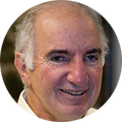
Prof. Alfred Goldberg Harvard Medical School, USA
3 TalksBiography
Dr. Goldberg, a Professor of Cell Biology at Harvard Medical School, has been on the faculty of that institution for nearly his entire academic career. His important discoveries have concerned the biochemical mechanisms and physiological regulation of protein breakdown in cells and the importance of this process in human disease.... read moreHis laboratory first demonstrated the non-lysosomal ATP-dependent pathway for protein breakdown, now termed the ubiquitin-proteasome pathway. They first demonstrated the involvement of the 20S and 26S proteasomes in this process and discovered the ATP-dependent proteases responsible for protein degradation in bacteria and mitochondria. Also of wide impact have been Dr. Goldberg’s studies showing that the ubiquitin proteasome pathway is critical in the clearance of misfolded proteins and in muscle atrophy seen in many disease states as well as in antigen presentation to the immune system. He and his colleagues also first introduced proteasome inhibitors now widely used as research tools, and he initiated the development of the proteasome inhibitor, Bortezomib/Velcade, now widely used in treatment of multiple myeloma.
Dr. Goldberg received his AB degree and his PhD in Physiology in 1968 from Harvard University, after attending Cambridge University (as a Churchill Scholar) and Harvard Medical School. Dr. Goldberg’s accomplishments have been recognized with many distinguished prizes, including the Novartis-Drew Award, Severo Ochoa Award (New York University), Knobil Prize for Medical Research (Univ Texas) and the Gabbay Award for Biotechnology and Medicine (Brandeis University), and Norman Alpert Prize for Medical Research. He is a Fellow of the American Academy of Arts & Sciences and a member of the Institutes of Medicine of the National Academy of Sciences. He has received honorary degrees from Cold Spring Harbor Laboratories and the University of Maastricht (Netherlands) and is among the 1% most cited authors in the life sciences.
